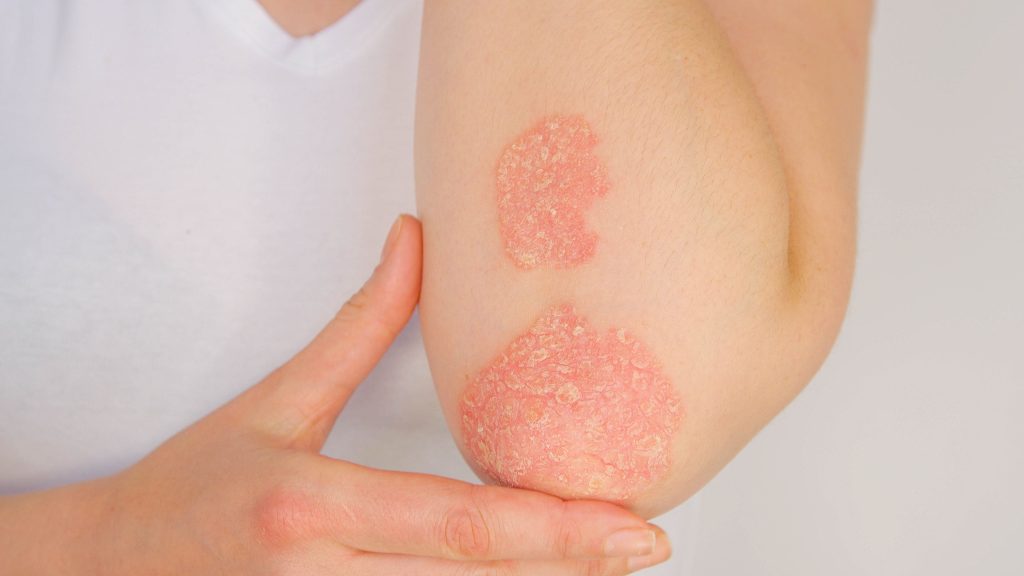Back to General Dermatology

What is Psoriasis?
Psoriasis is a chronic inflammatory skin condition characterized by the rapid buildup of skin cells. It occurs when the immune system mistakenly triggers an abnormal response, causing skin cells to multiply too quickly. The excess skin cells accumulate on the surface, leading to the formation of raised, pink patches covered with adherent white or silver scales. Psoriasis can affect different parts of the body.
Types of Psoriasis
- Plaque psoriasis: The most common form of psoriasis, characterized by raised, pink plaques covered with silvery scales.
- Guttate psoriasis: Typically appears as small, dot-like pink scaly lesions on the trunk, limbs, and scalp. Often triggered by a bacterial (streptococcus) or viral infection.
- Inverse psoriasis: Affects the skin folds, such as the armpits, groin, and under the breasts. It appears as smooth, pink , and eroded patches.
- Pustular psoriasis: Characterized by white, pus-filled blisters surrounded by inflamed skin. It can be localized or generalized.
- Erythrodermic psoriasis: A rare but severe form of psoriasis that can cover the entire body with bright red, peeling skin. It requires immediate medical attention.
Causes and Triggers
- Immune system dysfunction: Psoriasis is believed to involve an abnormal immune response, where T cells mistakenly attack healthy skin cells.
- Genetic predisposition: Family history and genetics increase the risk of developing psoriasis.
- Triggers: Various factors can trigger or worsen psoriasis symptoms, including stress, infections, certain medications, trauma/injury to the skin, smoking, and cold weather.
Symptoms and Impact
- Pink, raised patches of skin: These patches are often covered with thick, adherent, silvery scales.
- Itching and discomfort: Psoriasis can be itchy and may cause burning or discomfort in affected areas.
- Nail changes: Psoriasis can affect the nails, causing pitting, discoloration (oil spots), separation from the nail bed (onycholysis), and abnormal growth.
- Joint pain: Approximately 30% of people with psoriasis also have psoriatic arthritis. Psoriatic arthritis is a destructive arthritis that causes joint pain, stiffness, and swelling. Untreated Psoriatic arthritis can result in permanent joint deformities
Treatment Options
- Topical treatments: Creams, ointments, and lotions containing corticosteroids, vitamin D analogs, or retinoids can help reduce inflammation and slow skin cell growth.
- Phototherapy: Controlled exposure to ultraviolet light can improve psoriasis. This can be done with natural sunlight or in a controlled medical setting (Narrow band UVB)
- Systemic medications: Oral or injectable medications that suppress the immune system or target specific immune responses may be prescribed for moderate to severe psoriasis.
- Biologic drugs: These newer medications target specific immune pathways involved in psoriasis.
Psoriasis is a chronic skin condition that requires long-term management. While there is no cure, various treatment options can effectively control symptoms and improve quality of life. If you suspect you have psoriasis or are experiencing persistent skin symptoms, please call to schedule an appointment with one of our highly skilled board-certified medical providers for an accurate diagnosis and personalized treatment plan.
